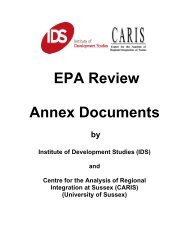The Impact of Energy Use on Poor Urban Livelihoods in ... - DfID
The Impact of Energy Use on Poor Urban Livelihoods in ... - DfID
The Impact of Energy Use on Poor Urban Livelihoods in ... - DfID
You also want an ePaper? Increase the reach of your titles
YUMPU automatically turns print PDFs into web optimized ePapers that Google loves.
A study <str<strong>on</strong>g>of</str<strong>on</strong>g> the impact <str<strong>on</strong>g>of</str<strong>on</strong>g> energy use <strong>on</strong> poor urban livelihoods <strong>in</strong> Arusha, Tanzania<br />
� How will women and girls use the saved time?<br />
<str<strong>on</strong>g>The</str<strong>on</strong>g> knowledge used to <strong>in</strong>form the answers has been drawn from the: semistructured<br />
<strong>in</strong>terviews (114); key <strong>in</strong>formant <strong>in</strong>terviews (31); case-studies (8); focus<br />
group discussi<strong>on</strong>s (6); workshops (8); and various sec<strong>on</strong>dary data; which are<br />
described <strong>in</strong> chapter 4.<br />
5.4.2 Level <str<strong>on</strong>g>of</str<strong>on</strong>g> access to and use <str<strong>on</strong>g>of</str<strong>on</strong>g> modern and traditi<strong>on</strong>al energy <strong>in</strong> urban<br />
households<br />
Electricity and kerosene are the two modern fuels used. Electricity is the aspirati<strong>on</strong>al<br />
fuel <str<strong>on</strong>g>of</str<strong>on</strong>g> choice. 76 However cost and unreliable supply make its use carefully managed<br />
by all the study households. 77 Figures 5.10 and 5.11 illustrate the use <str<strong>on</strong>g>of</str<strong>on</strong>g> electricity by<br />
the study households. Figure 5.10 shows:<br />
� <strong>in</strong> both wards all, or nearly all, the n<strong>on</strong>-poor households, whether male or female<br />
headed, are c<strong>on</strong>nected to the electricity supply;<br />
� <strong>in</strong> both wards, female headed n<strong>on</strong>-poor households generally make more use <str<strong>on</strong>g>of</str<strong>on</strong>g><br />
electricity for household activities than male-headed households. <str<strong>on</strong>g>The</str<strong>on</strong>g> excepti<strong>on</strong>s<br />
be<strong>in</strong>g that all male and female headed households, <strong>in</strong> Kaloleni, use electricity for<br />
light<strong>in</strong>g and that <strong>in</strong> Daraja Mbili the same proporti<strong>on</strong> <str<strong>on</strong>g>of</str<strong>on</strong>g> female and male headed<br />
households use electricity for cook<strong>in</strong>g. This may be because the husband <strong>in</strong><br />
male-headed households is more c<strong>on</strong>cerned with expense rather than<br />
c<strong>on</strong>venience;<br />
� more use is made <str<strong>on</strong>g>of</str<strong>on</strong>g> electricity <strong>in</strong> Kaloleni, generally Daraja Mbili households are<br />
(<strong>in</strong> some cases marg<strong>in</strong>ally) less likely to be c<strong>on</strong>nected to and use electricity for<br />
various activities;<br />
� poor female headed households do not use electricity for cook<strong>in</strong>g <strong>in</strong> either Daraja<br />
Mbili or Kaloleni;<br />
� poor female headed households are substantially worse <str<strong>on</strong>g>of</str<strong>on</strong>g>f <strong>in</strong> terms <str<strong>on</strong>g>of</str<strong>on</strong>g> electricity<br />
use than poor male headed households <strong>in</strong> Daraja Mbili; the difference is not as<br />
great <strong>in</strong> Kaloleni;<br />
� the number <str<strong>on</strong>g>of</str<strong>on</strong>g> poor female headed households that are disc<strong>on</strong>nected is higher <strong>in</strong><br />
Kaloleni than Daraja Mbili which seems to suggest that they are suffer<strong>in</strong>g a<br />
greater erosi<strong>on</strong> <strong>in</strong> their livelihoods;<br />
� female headed poor households make no use <str<strong>on</strong>g>of</str<strong>on</strong>g> electricity for cook<strong>in</strong>g;<br />
� female headed poor households <strong>in</strong> Kaloleni is the category which uses electricity<br />
least for light<strong>in</strong>g, ir<strong>on</strong><strong>in</strong>g, TV and radio;<br />
� largest number <str<strong>on</strong>g>of</str<strong>on</strong>g> disc<strong>on</strong>necti<strong>on</strong>s are for female headed poor households;<br />
� In both Daraja Mbili and Kaloleni, the use <str<strong>on</strong>g>of</str<strong>on</strong>g> TV and radio is higher am<strong>on</strong>g n<strong>on</strong>poor<br />
female headed households than poor and n<strong>on</strong>-poor male headed<br />
households. This situati<strong>on</strong> is almost reversed <strong>in</strong> male headed poor, and female<br />
headed n<strong>on</strong>-poor households where there is a higher use <str<strong>on</strong>g>of</str<strong>on</strong>g> radios and TV<br />
(Kaloleni <strong>on</strong>ly) <strong>in</strong> male headed households. This could be because men, who are<br />
the major users <str<strong>on</strong>g>of</str<strong>on</strong>g> radios and TVs <strong>in</strong> male-headed households, seek their<br />
enterta<strong>in</strong>ment outside the home. In the poorer households men do not have the<br />
same f<strong>in</strong>ancial resources to go out <strong>in</strong> the even<strong>in</strong>g<br />
76 See Appendix E2 for a breakdown <str<strong>on</strong>g>of</str<strong>on</strong>g> comparative fuel costs <strong>in</strong> Arusha 2002-2004<br />
77 <str<strong>on</strong>g>The</str<strong>on</strong>g>re had been <strong>on</strong>e fire us<strong>in</strong>g lpg and as a c<strong>on</strong>sequence households were afraid to us it.<br />
- 36 -<br />
Development Plann<strong>in</strong>g Unit, UCL L<strong>on</strong>d<strong>on</strong><br />
Dr. Sheilah Meikle and Patrice North
















